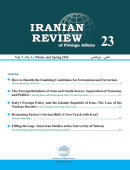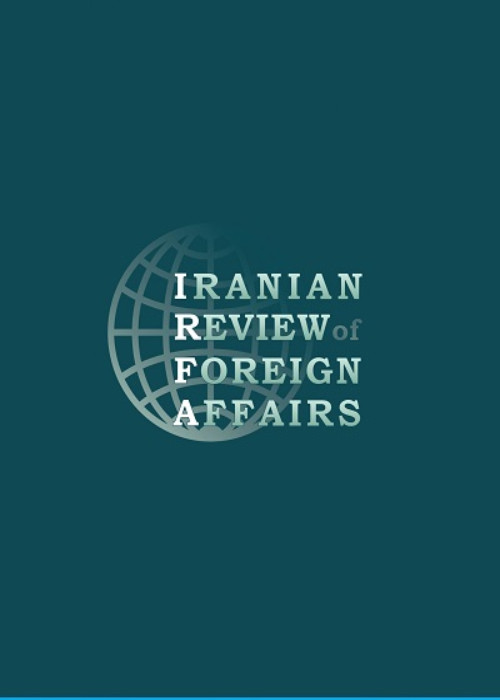فهرست مطالب

Iranian Review of Foreign Affairs
Volume:7 Issue: 1, Winter-Spring 2016
- تاریخ انتشار: 1396/02/30
- تعداد عناوین: 5
-
-
Pages 5-20Today global community encounter with two cancerous phenomena: Terrorism and Extremism. These twin problems stand out as the natural outcome of intrinsic failing in the current international situation. They don''t confine to any part of the world nor exclusive to one religion, also cannot be combated on a regional basis or through heavy reliance on military hardware. Now it is time to look at these challenges with open eyes without illusion and self-delusion to find an effective solution. This article will illustrate how effectively deal with these two formidable phenomena.Keywords: Terrorism, Extremism, Intervention, Elimination, Durable solution
-
Pages 21-44Iran is the third largest market for Korean products in the Middle East, playing an important role in procuring the countrys energy. Despite relatively long history of their trade relations, the two countries have adopted a foreign policy of separation of politics from economy. The main question of this study is, therefore, to realize the most important elements impacting the two countries approach towards each other. Through comparative-analysis method, this research examines important factors impacting and being employed in the foreign policy model of the two countries, and sheds light on the political, economic and geopolitical settings conducive to foreign policies of the two countries. The results of the present study indicate that there are various factors that impact the decisions and equations related to foreign policies pursued by these two countries, including the presence and influence of the US in East Asia, conflicts with North Korea, Chinas increased political and economic relations with Iran, Irans foreign policy after the Islamic revolution, and South Koreas relations with Arab countries.Keywords: foreign policy, economic relations, Iran, South Korea, geostrategy
-
Pages 45-67Italy has been, throughout history, a descent trade partner for Iran. However, the political relations of the two countries have never been as deep and expanded as the economic ones. During the years of the nuclear stand-off, as the most significant issue in Iran foreign policy, one everpresent question was why Italy is not a negotiating partner with Iran? In this paper, the most important paradigms of Italian foreign policy and those factors affecting its relations with Iran are dealt with. The paper argues that, the two paradigms of Eurocentrism and Atlanticism have taken terms to dominate Italian foreign policy. With changes within the Italian governments, one of these paradigms gains precedence, accordingly Italian foreign policy changed toward Iran. The current paper makes use of the neoclassical realism in which both internal and external factors impacting foreign policy are taken into consideration. The paper argues that being or not being a party to negotiation with Iran was not a matter of consensus among Italian governments. The shifts in the governments with rise and fall of left and right parties brings about paradigm shifts which in turn lead to change in policies with respect to Iran.Keywords: Italy's foreign policy, Eurocentrism, Atlanticism, second republic, Iran's nuclear dossier
-
Pages 69-89After five years of collision over Syria, Turkey and Iran are collaborating, albeit with differing priorities and goals, aiming at a political settlement in Syria. A main reason for this change has been Turkeys shifting Syria policy. But why has Turkeys Syria policy shifted and how does it affect the dynamics of Iranian Turkish relations. My argument is that Russias military role in Syria and its stance against Turkey after the fighter jet incident of November 2015, along with the insecurity spilling over of the Syrian crisis started into Turkey, made Ankara to go beyond its anti-Assad zero-sum-game. This triggered the shifts in Turkeys Syria policy, which in turn brought about new dynamics into Syria and to the Iranian Turkish relations as well. The article is focused on the years following Russias military involvement in Syria with some references to the beginning of the Syrian crisis.Keywords: Iran, Turkey Relations, Syrian Crisis, Syrian Peace Talks, Kurdish Question
-
Pages 91-112American Studies is a well-documented tradition that was initiated by the United States government outside the country as a part of US public diplomacy efforts during the Cold War. On the other hand, it also has its roots in twentieth century United States academia. Hence, like the much older tradition of Oriental studies, this interdisciplinary field of inquiry has its roots in the West and this by itself has significant implications with regards to the nature of the production of knowledge in this area of study as well as its broader social, cultural, and political implications. It also seems that strong similarities exist in the American exceptionalism existing in much of American Studies and the Eurocentrism pervasive in the much older field of Oriental Studies. This is important to keep in mind when attempting to understand some of the reasons why the University of Tehran chose to initiate what is officially North American Studies, but what students and colleagues at the university usually call American Studies.Keywords: American Studies, Orientalism, Exceptionalism, Iran


